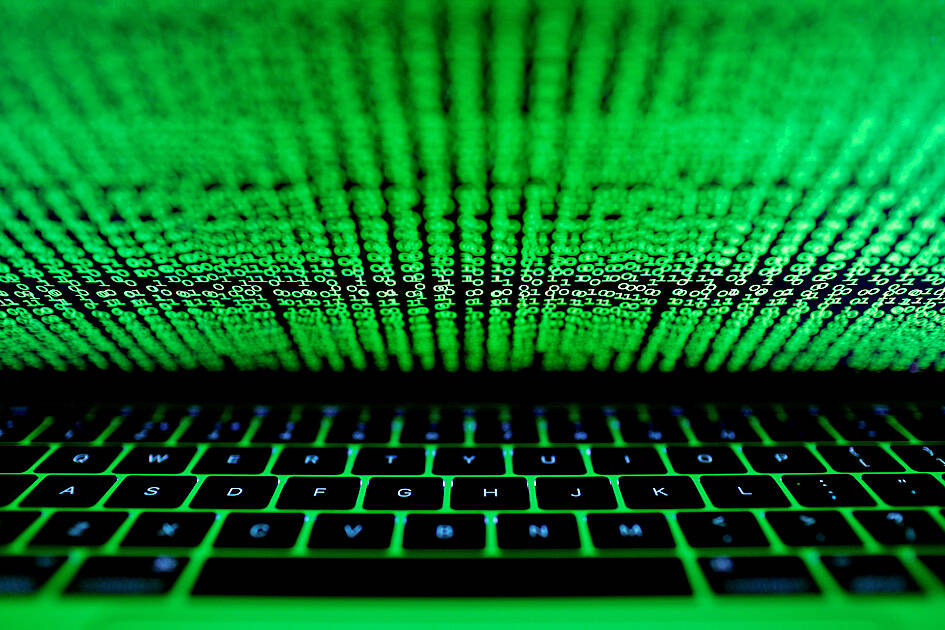Taiwan was the No. 1 target of cyberattacks in the world during the first quarter of this year, IT security company Check Point said yesterday.
The average number of weekly cyberattacks globally per organization rose 7 percent from a year earlier to 1,248 during the first quarter, targeting government agencies, private firms and education institutions, the company said.
However,the number of weekly cyberattacks against Taiwan per organization averaged 3,250 over the period, 2.6 times the global average, it said.

Photo: Reuters
Globally, academic institutions, universities and research centers were the No. 1 targets, coming under 2,507 cyberattacks per week on average, an increase of 15 percent from a year earlier, it said.
The trend points to the vulnerability of such institutions amid online teaching and videoconferencing, it said, adding that most of them lack the IT competency for data protection.
They can become easy targets when expanding their network, as hackers can target wireless access point stations, it said.
The No. 2 target of cyberattacks globally were government agencies and military branches, which came under 1,725 attacks per week on average, an increase of 3 percent annually, the company said.
Hospitals and healthcare institutions were targeted 1,684 times per week on average, up 22 percent annually, while retailers were attacked 1,079 per week on average, up 49 percent from a year earlier, Check Point said.
By region, African countries experienced the most attacks globally at 1,983 per week on average, down 2 percent from a year earlier, the report said.
Countries in the Asia-Pacific region came under 1,835 attacks per week on average, up 16 percent, while North American countries sustained an average of 950 attacks per week, an increase of 9 percent from a year earlier.
Check Point urged cybersecurity agencies to remain vigilant at all times, initiate new policies, and eliminate potential cybersecurity loopholes and breach points.
They should apply integrated solutions for end-to-end preventive controls against hackers using the latest technology, the company said.
Hackers might use remote access of phishing e-mails to mount attacks, it said, urging cybersecurity units to make sure their IT frameworks adopt “network segmentation” to confine attacks to a limited section of their network.

AIR SUPPORT: The Ministry of National Defense thanked the US for the delivery, adding that it was an indicator of the White House’s commitment to the Taiwan Relations Act Deputy Minister of National Defense Po Horng-huei (柏鴻輝) and Representative to the US Alexander Yui on Friday attended a delivery ceremony for the first of Taiwan’s long-awaited 66 F-16C/D Block 70 jets at a Lockheed Martin Corp factory in Greenville, South Carolina. “We are so proud to be the global home of the F-16 and to support Taiwan’s air defense capabilities,” US Representative William Timmons wrote on X, alongside a photograph of Taiwanese and US officials at the event. The F-16C/D Block 70 jets Taiwan ordered have the same capabilities as aircraft that had been upgraded to F-16Vs. The batch of Lockheed Martin

GRIDLOCK: The National Fire Agency’s Special Search and Rescue team is on standby to travel to the countries to help out with the rescue effort A powerful earthquake rocked Myanmar and neighboring Thailand yesterday, killing at least three people in Bangkok and burying dozens when a high-rise building under construction collapsed. Footage shared on social media from Myanmar’s second-largest city showed widespread destruction, raising fears that many were trapped under the rubble or killed. The magnitude 7.7 earthquake, with an epicenter near Mandalay in Myanmar, struck at midday and was followed by a strong magnitude 6.4 aftershock. The extent of death, injury and destruction — especially in Myanmar, which is embroiled in a civil war and where information is tightly controlled at the best of times —

Taiwan was ranked the fourth-safest country in the world with a score of 82.9, trailing only Andorra, the United Arab Emirates and Qatar in Numbeo’s Safety Index by Country report. Taiwan’s score improved by 0.1 points compared with last year’s mid-year report, which had Taiwan fourth with a score of 82.8. However, both scores were lower than in last year’s first review, when Taiwan scored 83.3, and are a long way from when Taiwan was named the second-safest country in the world in 2021, scoring 84.8. Taiwan ranked higher than Singapore in ninth with a score of 77.4 and Japan in 10th with

SECURITY RISK: If there is a conflict between China and Taiwan, ‘there would likely be significant consequences to global economic and security interests,’ it said China remains the top military and cyber threat to the US and continues to make progress on capabilities to seize Taiwan, a report by US intelligence agencies said on Tuesday. The report provides an overview of the “collective insights” of top US intelligence agencies about the security threats to the US posed by foreign nations and criminal organizations. In its Annual Threat Assessment, the agencies divided threats facing the US into two broad categories, “nonstate transnational criminals and terrorists” and “major state actors,” with China, Russia, Iran and North Korea named. Of those countries, “China presents the most comprehensive and robust military threat